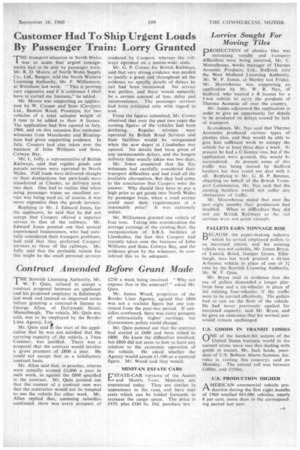Customer Had To Ship Urgent Loads By Passenger Train: Lorry Granted
Page 99

If you've noticed an error in this article please click here to report it so we can fix it.
THE transport situation in North Wales was so acute that urgent consignments had .to be sent by passenger train, Mr. R. D. Moore, of North Wales Supply Co., Ltd., Bangor, told the North Western Licensing Authority, Mr. F. Williamson, at Wrexham last week. "This is proving very expensive and if it continues I shall have to curtail my business," he added.
Mr. Moore was supporting an application by W. Cooper and Sons (Carriers), Ltd., Bastion Road, Prestatyn, for two vehicles of a total unladen weight of 8 tons to be added to their A licence. The application had first opened in July, 1960, and on this occasion five customer witnesses from Manchester and Birmingham had given supporting evidence. In July, Coopers had also taken over the business of John Williams and Sons. Colwyn Bay.
Mr. L. Jolly, a representative of British Railways, said that regular goods and parcels services were operated to North Wales. Full loads were delivered straight to their destinations but part-loads were transferred at Chester, so delivery took two days. One had to realize that when using passenger trains an excellent service was being used so, of course, it was more expensive than the goods services.
Replying to Mr. J. Edward Jones, for the applicants, he said that he did not accept that Coopers offered a superior service to that of the railways. Mr. Edward Jones pointed out that several experienced businessmen, who had carefully considered their transport problems, had said that they preferred Coopers' services to those of the railways. Mr_ Jolly said that the probable reason for this might be the small personal services rendered by Coopers, whereas the railways operated on a nation-wide scale.
Mr. G. P. Crowe, for British Railways, said that very strong evidence was needed to justify a grant and throughout all the evidence no specific details of delays by rail had been mentioned. No service was perfect, and there would naturally be a certain amount of loss, delay and inconvenience. The passenger services had been criticized only with regard to cost.
From the figures submitted, Mr. Crowe observed that over the past two years the earning figure; of the vehicles had been declining. Regular services were operated by British Road Services and their facilities would be reorganized when the new depot at Llandudno was opened. No details had been given of any unreasonable delays, and the longest delivery time usually taken was two days.
Mr. Jones countered that the five witnesses had carefully considered their transport difficulties and had tried all the available alternatives. But they had come to the conclusion that Coopers were the answer. Why should they have to pay a high price to get goods into North Wales by passenger train, when a road service could meet their requirements at a reasonable price? It was extremely unfair.
Mr. Williamson granted one vehicle of four tons. Taking into consideration the average earnings of the existing fleet, the reorganization of B.R.S. facilities at Llandudno, the fact that Coopers had recently taken over the business of John Williams and Sons, Colwyn Bay, and the evidence given by the witnesses, he considered this to be adequate.




































































































































































































































